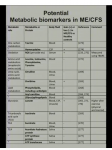Jesse2233
Senior Member
- Messages
- 1,942
- Location
- Southern California
Wondering if anyone can help me make sense of what my different Krebs Cycle labs mean.
Symptomatically I am better than I was during the initial labs, but not well.
During the time between Genova labs I added:

This is from a NutraEval in June

And this is from a lab at UCLA also in June

Thanks!
- My pyruvate and isocitric levels seemed to have more or less normalized, and cis-aconitate has improved
- My succinic and malic levels have gone from too low to too high.
- What's additionally confusing is that even though both labs are from Genova, the CardioION and NutraEval have different reference ranges, so I can't exactly compare apples to apples.
- And then to make things even more confusing, there's a UCLA lab done shortly after the NutraEval still showing high pyruvate.
Symptomatically I am better than I was during the initial labs, but not well.
During the time between Genova labs I added:
- Colostrum
- MitoQ
- Complete Mineral Complex
- IVIG
- Low Dose Naltrexone
- CoEnzyme Q10
- Equilibrant
- Milk Thistle
This is from a NutraEval in June
And this is from a lab at UCLA also in June
Thanks!

